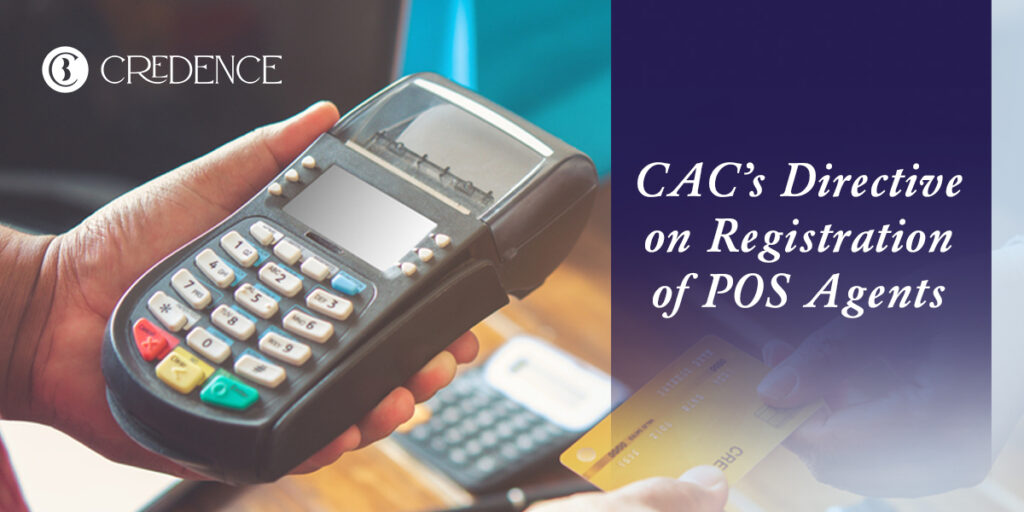Introduction
- On May 7, 2024, the Corporate Affairs Commission (CAC) issued a directive requiring Point of Sale (POS) agents to register as businesses with the CAC within a two-month deadline (July 7, 2024). The directive is an attempt to curb the increasing concern over fraudulent activities facilitated through POS transactions in Nigeria. This newsletter examines the directive and the implication on PoS agents in Nigeria.
Background
- According to EFInA Access to Finance 2023 Survey, financial inclusion in Nigeria has grown significantly from 56% in 2020 to 64% in 2023. This progress can largely be attributed to the role POS agents play in bridging the gap between financial institutions and the underserved population.
- However, amidst this progress, the rise in fraud incidents through POS transactions is alarming; reports from the Nigeria Inter-Bank Settlement System (NIBSS) indicate that POS transactions account for over 26.37% of fraud cases in the country. As such, it is a step in the right direction to mandate POS agents to register with the CAC to ensure that fraud incidents are traceable.
- However, questions arise as to the regulatory authority of the CAC to regulate or issue directives to agent banks and POS agents alike considering that the Central Bank of Nigeria (CBN) is saddled with the responsibility to regulate financial institutions, including financial services, and providers such as agent banks and payment terminal service providers that issue POS terminals.
CBN Regulation of Agent Banking
- The regulation of agent banks in Nigeria is under the purview of the CBN. As such, the CBN Guidelines for the Regulation of Agent Banking and Agent Banking Relationships (the Guideline) make provisions for the operations of agent banking in Nigeria.
- According to Section 4.1 of the Guideline, certain eligibility requirements must be met for entities to qualify as agents. For instance, an agent must have been in legitimate commercial activities for at least 12 months before becoming an agent. The Guideline further specifies that only registered businesses can be issued POS terminals, which includes, Limited liability companies, Sole proprietorships, Partnerships, Cooperative Societies, Public entities, and Trusts.
- The requirement outlined in the Guideline implies that only registered businesses are eligible to serve as agents, excluding individuals. However, the reality differs, as both registered and unregistered individuals operate POS machines in Nigeria through agent banking relationships with licensed financial service providers.
- The Guideline exempts entities that are not registered to obtain the consent of the applicable regulatory authority or oversight body prior to being appointed an agent.[1] Similar to the issue of unregistered entities, it is also evident that POS agents or even agent banking service providers have generally not complied with this requirement.
- Therefore, it is not surprising that the issuance of POS terminals to unregistered agents has engendered participation in the value chain by bad actors which has now increased fraudulent activities, money laundering, customer exploitation, and other sharp and unintended practices within the market.
- As such, the enforcement of registration requirements for POS agents is undoubtedly necessary to curb criminal activities and ensure compliance with the CBN Guideline. However, the involvement of the CAC in the implementation raises questions about its regulatory oversight functions. The CAC’s primary responsibility is the regulation and supervision of the formation, incorporation, management and winding up of companies.[2]
Is the Directive under the Purview of CAC?
- The CAC has claimed that the directive is merely an enforcement of a memo issued by the CBN to the banks and CBN’s regulatory framework. It has been reported that the CBN issued a memo on April 30, 2024, instructing individuals holding Agent banking authorization to register their businesses with the CAC in line with Section 863 of the Companies and Allied Matters Act (CAMA) 2020.
- Therefore, while the intention of the CAC may be deemed in the interest of the public, however, it is questionable whether the CAC is empowered to issue market directive targeted at regulated entities. Without doubt, the CAC may facilitate the registration of the agents and ensure the process is seamless but may not directly enforce the CBN memo or Guideline (as the case may be).
- Moreover, the effectiveness of the CAC’s directive remains uncertain, given its limited authority and resources; without a mechanism for monitoring compliance and maintaining accurate records, the CAC will struggle to verify the registration status of POS agents and enforce regulatory standards consistently. Practically, the CAC lacks the regulatory oversight and competence to enforce any such directive or ensure compliance.
- In light of these considerations, the ultimate authority and responsibility to ensure compliance of the directive lies with the CBN.
- A common ground is a collaboration between CAC and the CBN to ensure the effective implementation of registration requirements for POS agents, as opposed to an issuance of market directive or enforcement notice by the CAC.
Conclusion
In conclusion, it is important to note that according to the CBN Guidelines for Agent Banking, a POS agent can register as any legal entity under CAMA. This means that POS agents are not limited to registering solely as a business name, as stated in the directive issued by the CAC.
For further clarification or assistance regarding compliance with the CAC directive or any related legal matters, you can contact us via email – lawyers@credence-law.com.
[1] Section 4.1 (ix) of the CBN Guidelines for the Regulation of Agent Banking and Agent Banking Relationships
[2] Section 7 of the Companies and Allied Matters Act 2020

